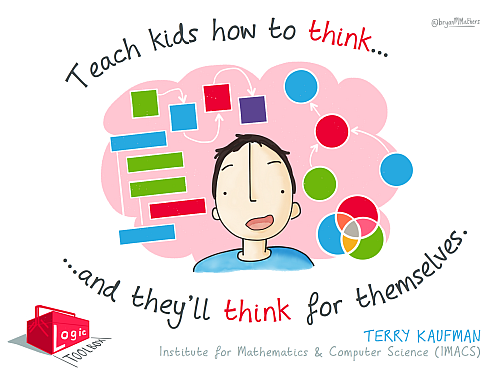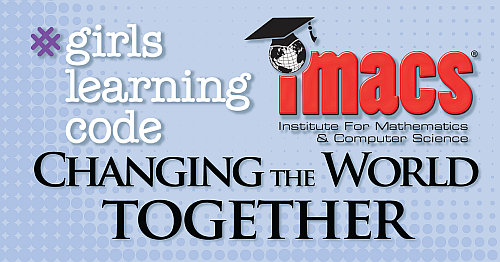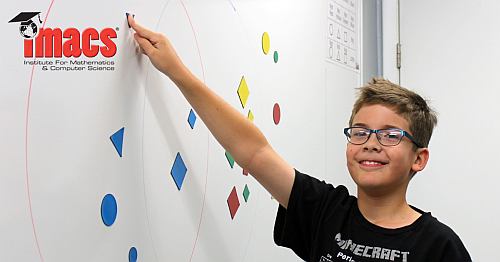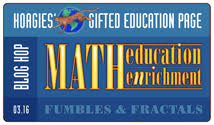
As parents we instinctively want to help our children when they struggle. Our impulse is often to just fix the problem ourselves. While this approach makes sense when children are very young, as they grow it becomes counterproductive. In rescuing our kids, we provide a quick fix but deny them opportunities to practice important skills that they will need to become independent adults.
This is true in general and certainly with respect to education. As children grow, we should encourage them to develop the thinking skills that they will need in college and in their chosen careers. In what may seem like counterintuitive advice, teaching kids to think sometimes involves parents doing less, not more. Here are five tips on how parents can help children learn to think for themselves.
1. Don't be so quick to offer help. If your child asks you for help with school work, first consider how much independent effort she has truly given before turning to you. In a world of online programs that provide hints at the click of a button, it's easy to fall into the trap of thinking that getting to the answer quickly is good and struggling is bad. But math education research shows that a healthy amount of struggle actually leads to deeper learning. By answering your child's questions too soon, you can adversely affect how well she learns. Instead, remind her that it is perfectly normal to take a good amount time to work through problems, allow sufficient time in her schedule to do so, and encourage her to be patient with herself. Once you sense that she has put in a reasonable amount of independent effort on a problem, it's okay to offer hints that give just enough information to get her thinking again without giving away too much.
2. Don't point out mistakes before children have had a chance to discover the mistakes themselves. When you point out mistakes to your child too soon, he is less likely check his own work because he knows you'll do it for him. You also curtail the learning and brain growth that happens when he has to determine on his own that he made an error and what the error is. Finally, you may be signaling that you disapprove of making mistakes, which can lead to other problems such as an unwillingness to try challenging activities. When it's time to bring mistakes to your child's attention, a better way is to let him know that he has made at least one error but not tell him what, where, or how many. This approach necessitates that he will have to look carefully over all of his work and encourages the good habit of doing so on his own as he gets older.
3. Do encourage children to correct their mistakes. Too often, bright students just want to forget about the mistakes they make on school work, especially if they have been led to believe that smart people don't make mistakes. But a mistake means that the problem was challenging for your child, so she should definitely look back at it and work to correct her understanding. Often times we learn better from mistakes than from successes, and research shows that our brains actually grow more from making and correcting mistakes. Help your child see the good in mistakes by using them as opportunities to learn more.
4. Do ask open-ended questions. Asking questions is a highly effective way of guiding your child to think his own way to the answer — What information do you have? What information are you missing that could be helpful? How can you break up the problem into more manageable pieces? When your child was young, he probably asked you a lot of "Why?" questions. As he gets older, turn the tables and ask him why in the same inquisitive, non-judgmental way. Why do you make this assumption? Why do you take that approach? Why does this lead to that? As you know from being on the answering end of "Why?" questions, formulating a thoughtful response takes effort. For a growing mind, that's a good thing. One caveat: Be sure to avoid doing the thinking for your child by giving away too much information in the form of a question such as, "Shouldn't you combine like terms first?"
5. Do provide challenges that require deep thinking. Just as your muscles won't grow from lifting light weights, your child's thinking skills won't develop from doing easy problems. What's more, curious, young minds are naturally engaged by interesting, hard problems as long as those minds are not yet overcome with a fear of making mistakes. Intellectual challenges also provide opportunities to develop good study habits, resiliency from surviving the inevitable mistakes, and genuine confidence that comes from knowing you can handle hard problems.
Ladies Learning Code and the Institute for Mathematics and Computer Science (IMACS) are partnering to award over $3,000 in scholarships to participants in the 2016 Girls Learning Code Camps and members of GLC’s Teen:Club. The two full and three half scholarships will allow recipients to enroll in IMACS’ introductory computer science course, University Computer Science I (UCS1).
240 girls ages nine to twelve are expected to attend Girls Learning Code Camps in Toronto this March and Summer. The camps are designed to help girls see technology in a whole new light — as a medium for self-expression, and as a means for changing the world. IMACS will award one full scholarship and one half scholarship among applicants who attend the camps. All campers are invited to apply.
Shuli Jones attended the very first Girls Learning Code camp as a 6th grader back in 2012 where she won a half scholarship to UCS1. She is now a sophomore in high school and recently scored a ‘5’ on the AP Computer Science A exam as a freshman. Since starting IMACS’ computer science courses soon after the camp, Shuli has been one of IMACS’ top CS students.
IMACS will award the other full scholarship and two half scholarships to members of GLC’s Teen:Club. In Teen:Club, 13 to 17 year old girls focus on solving problems, turning ideas into reality and learning about what a future in technology could look like. All members are invited to apply.
"Now that we have been running youth programs for 4 years, we are really starting to see our participants move on to technical career paths, pursuing Computer Science in University and coming back to participate in our programs as mentors, inspiring the next generation of girls," says Laura Plant of Ladies Learning Code. "We’re excited for our girls to have an opportunity to study computer science at a high level with IMACS."
"IMACS believes in the potential of bright girls and young women to shape a better future for all people," adds IMACS president Terry Kaufman. "We are thrilled to be working with Ladies Learning Code again to encourage more girls to pursue computer science in college and in their careers."
Scholarship Information
The course, UCS1, is a challenging and engaging introductory programming course that gives students the tools they need to excel as a computer science major in college. UCS1 teaches the fundamental principles of computer science at the university level but was developed for talented middle and high school students.
Scholarship applicants must submit a 100-250 word essay to Ladies Learning Code on what they hope to get out of this program. They are also required to pass the online eIMACS Aptitude Test. The application deadline for these scholarships is August 31st 2016.
Applicants may register for the eIMACS Aptitude Test at www.eimacs.com/aptitude. On the online registration form, enter "Girls Learning Code 2016" in the box for "How did you hear about IMACS?"
About Ladies Learning Code
Ladies Learning Code is a Canada-wide not-for-profit organization that runs workshops for women and youth who want to learn beginner-friendly computer programming and other technical skills in a social and collaborative way. Today they have 22 chapters (and counting) across Canada, a thriving girls’ program called Girls Learning Code and co-ed kids program called Kids Learning Code. With sponsors and community partners that include TELUS, Microsoft, Facebook, Autodesk, Google and many more, Ladies Learning Code has become synonymous with technology education in Canada.
About IMACS
Founded in 1993 by a team of mathematicians, computer scientists and educators, IMACS offers talented middle and high school students a range of online courses in university-level mathematics and computer science that are recognized by many prestigious universities. IMACS also offers math and computer enrichment classes at its US centers in Florida, North Carolina, Missouri, and Connecticut. Over 4,500 students throughout the US and the world attend local IMACS classes or study its online courses. For more information on IMACS visit www.imacs.org.
Contact
For Ladies Learning Code:
Laura Plant, Co-Executive Director
laura@ladieslearningcode.com
416-579-9809
For IMACS:
Natasha Chen, Communications Director
nchen@imacs.org
954-791-2333
Logic is the systematic study of reasoned argument. Why study logic? For students planning to take university-level math courses, which typically involve reading and writing proofs, the benefits are evident. But even for students heading in a different direction, developing strong logical reasoning skills has benefits too.
Logic Supports Learning Mathematics
Few would dispute that arithmetic is a fundamental base upon which the successful learning of math is built. Consequently, the development of arithmetic skills receives enormous attention in elementary school. Logic is equally fundamental to learning all other areas of math but is rarely taught in elementary school. Were students to develop a strong foundation in logic at a young age, their capacity to understand middle and high school math would be greatly enhanced.
In arithmetic, we learn how to combine or break apart numbers in order to proceed from the information given to the answer sought. If we bake three dozen cookies, multiplication tells us how many cookies we have in all. If 17 cookies are left, subtraction tells us how many were eaten. Honing arithmetic skills in elementary school allows students to quickly and accurately call upon them later, thereby making it is easier to learn more advanced math in the future.
Logic is a similarly powerful and essential tool for learning more advanced math. Whereas arithmetic is used in constructing and deconstructing information that is numeric in nature, logic is essential in constructing and deconstructing assertions that are mathematical in nature.
Students typically encounter a weak version of proofs and logic for the first time in high school geometry. But by then, pre-algebra and elementary algebra have already been taught as mostly procedural rules and algorithms to accept at face value. As a result students do not develop a genuine understanding of the derivation of those rules and algorithms and why they work. By the time students reach high school, their natural curiosity about mathematical ideas has been reduced to a hard-to-break habit of memorizing and applying rules blindly.
A worthy goal of the Common Core math standards is to develop mathematical understanding in addition to procedural skills. True mathematical understanding comes with seeing how knowledge is pieced together step-by-step on the path to deriving an important result. This is similar to what we know about developing scientific understanding in young minds — hands-on projects make learning stick better than memorizing facts. Math’s version of "hands-on" is your brain working its way through the reasoning that mathematicians followed in order to provide us with neat and tidy rules.
With a strong foundation in logical reasoning, students would have the key analytical tool needed to work their way successfully through the reasoned arguments that lead to the rules. Some may even wish to achieve the deepest understanding by using logic to independently derive the mathematical truths they were once asked only to memorize.
Logic Supports Complex Problem Solving Beyond Mathematics
The amazing thing about logic is that it makes us better thinkers and problem solvers well beyond mathematics. Computer science could not exist without logic. If you want to understand the underlying principles and algorithms and be able to apply them in any programming environment, you must understand logic. Engineering disciplines rely on logic too, especially electrical engineering as any Minecrafter worth her redstone will tell you. The entire practice of law is founded upon reasoned argument, which is why the LSAT has sections on logical reasoning and analytical reasoning.
People who learn to think logically are better at analyzing complex problems. Mathematics, with its diversity of complex problems, is a natural thought playground for developing logical thinking skills. The first steps in solving any math problem are assessing the situation and coming up with a plan of attack. Can you view the larger problem as a combination of more manageable cases? Can you take what you know and derive what you need to know? Would additional information lead you to certain conclusions? Answering these types of questions requires logical thinking.
People who learn to think logically are also better at assembling solutions. Once you have assessed the problem, broken it down, and gathered the necessary information, how do you put it all together to arrive at a solution? When faced with a novel situation, can you devise an approach where there was not one before? As the pace of change in our world accelerates, every field increasingly needs people who can strongly grasp core concepts and combine them sensibly to solve any problem, especially unfamiliar ones. Learning to apply logical thinking to mathematical situations is excellent training for handling complex problems, no matter which college major or career you choose.
Logic has a way of promoting clarity of thought in understanding ideas that were previously unfocused or muddled. Whether you are planning on becoming a professional mathematician or just trying to get through math homework on your way to a different intellectually demanding career, there is no doubt that strong logical reasoning skills would ease your path.
This blog article is part of the Hoagies' Gifted Education Page March 2016 Blog Hop on Math Education Enrichment. Please click on the Blog Hop image above to learn more about Math Education Enrichment from other Hoagies' Blog Hop participants.













